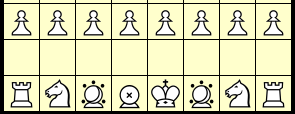Wild Tamerlane Chess
Wild Tamerlane Chess is a variant of Tamerlane II where the strongest pieces, Queens and Eagles, are present on the initial setup instead of appearing by promoting Princes and Ships.
In addition to the standard chess pieces, there are Elephants and Cannons also found in Shako, and Camels found in Tamerlane II
Princes and Ships are not playing here, therefore the Pawn is the only piece to promote. It promotes to a Queen or an Eagle, at the player's choice, when reaching the last opposite row of the board.
This game was invented in 2000.
You can play Wild Tamerlane Chess with Game Courier here!
Setup
The board has 11x11 checkered squares, with light colored squares at each corner.
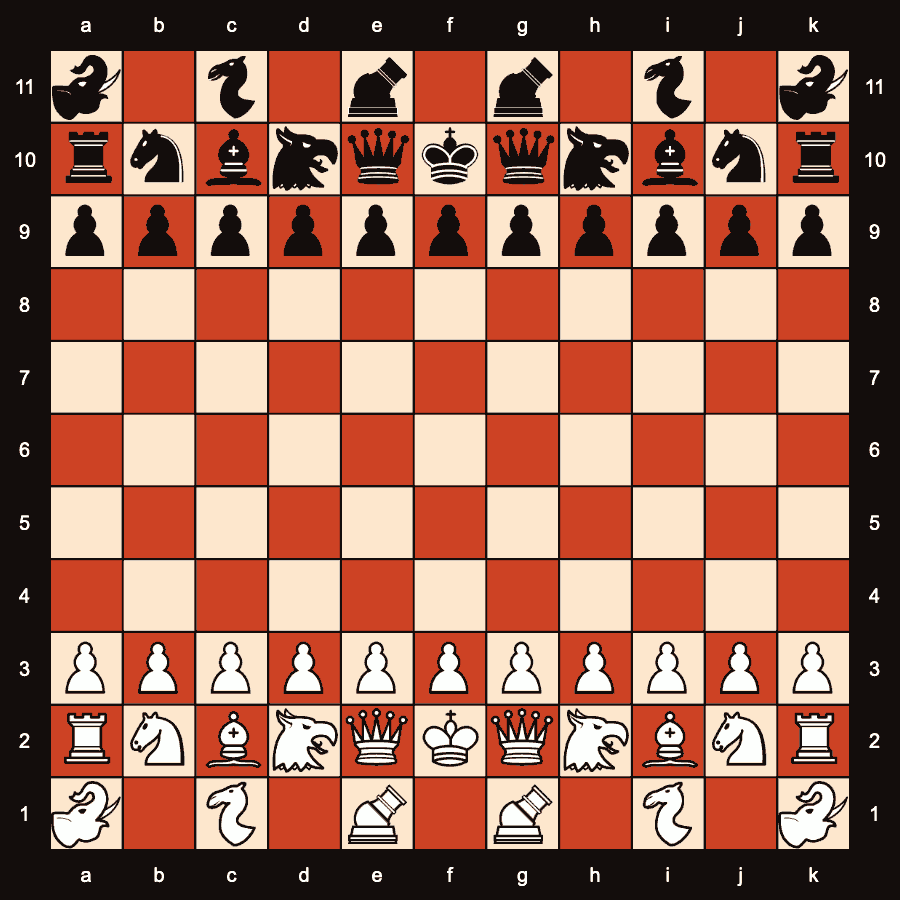
White: Elephant a1, k1; Camel c1, i1; Cannon e1, g1; Rook a2, k2; Knight b2, j2; Bishop c2, i2; Eagle d2, h2; Queen e2, g2; King f2; Pawn a3 to k3.
Black: Elephant a11, k11; Camel c11, i11; Cannon e11, g11; Rook a10, k10; Knight b10, j10; Bishop c10, i10; Eagle d10, h10; Queen e10, g10; King f10; Pawn a9 to k9.
There are 28 pieces per side: 1 King, 2 Queens, 2 Eagles, 2 Bishops, 2 Knights, 2 Rooks,
Pieces
King: moves 1 step in every (8) directions on a not attacked square. The King is in check if it is attacked by one or several enemy pieces. It is forbidden to play a move letting his King in check.
There is no castling in Wild Tamerlane. At his first move, the King may jump to a free square at two squares' distance. For instance, from f2, it can jump to d1, d2, d3, d4, e4, f4, g4, h4, h3, h2 or h1). It does not matter if the square jumped over is occupied or not; however, the jump is forbidden if that intermediate square is threatened by an enemy piece. When jumping like a Knight, at least one of the two intermediate squares must be free of threat (e.g., if jumping from f2 to h3, either g2 or g3 must not be under attack). The King's jump is not permitted if the King is in check. This rule replaces castling. Identical to Metamachy and several other large chess variants from Jean-Louis Cazaux.
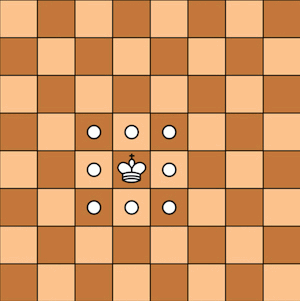
Queen: slides to any square along the file, the rank or a diagonal on which it stands. Identical to standard chess.
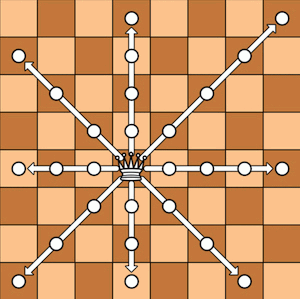
Eagle: moves one square diagonally and then, slides away of an indefinite number of squares vertically or horizontally. It is authorized to go only one square diagonal. It can not jump and the unobstructed path must start with the diagonal movement. This piece is almost as powerful as the Queen and is inspired by the Giraffe from Tamerlane's Chess and the Aanca (a mythical giant bird preying elephants, mistaken for a gryphon) from Alfonso X's Grande Acedrex. Identical to Metamachy.
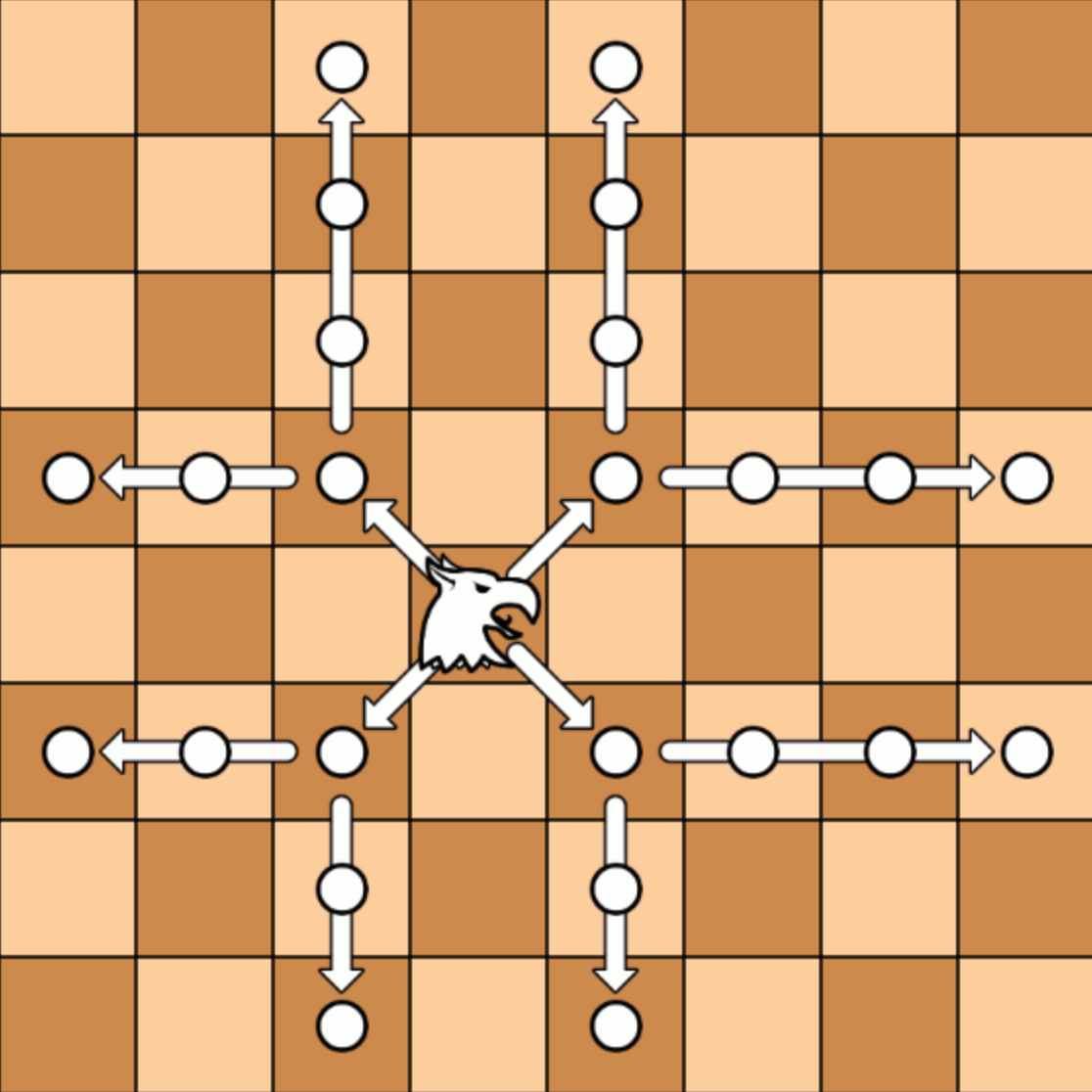
Rook: moves to any square along the file or the rank on which it stands. Identical to standard chess
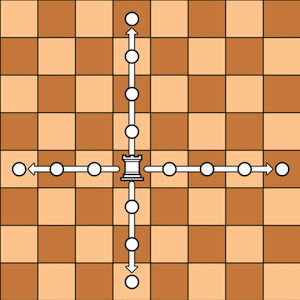
Bishop: slides to any square along a diagonal on which it stands. Identical to standard chess
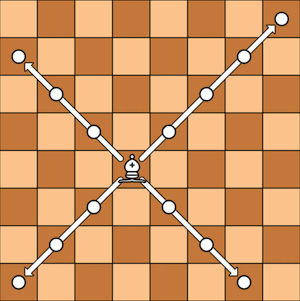
Knight: a (2,1) jumper, it jumps to the opposite square of a 2x3 rectangle. No matter what the intermediate square contains. Identical to standard chess

Camel: a (3,1) jumper, it jumps to the opposite square of a 2x4 rectangle, like an extended Knight. No matter what intermediate squares contain. Note that it always stays on the same color of square. A well known piece from medieval Muslim great Chess like Tamerlane's Chess. Identical to Metamachy

Cannon: exactly as in Xiangqi. The Cannon moves without taking like a Rook, but it takes by going in a straight horizontal and vertical line and jumping over exactly one piece. When a Cannon takes a piece, there must be exactly one piece between the original and final square of the Cannon's move - this piece may be of either color. This is identical to the move of the Cannon in Shako and Metamachy.
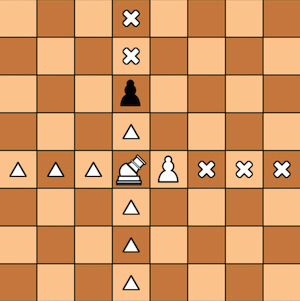
Elephant: it moves one or two squares diagonally. When an Elephant moves two squares, no matter what intermediate squares contain. Note that it always stays on the same color of square. The Elephant moves as the combined Alfil and Ferz from Shatranj, two pieces which were also present in mediaeval Chess and have disappeared with the birth of modern moves for the Bishop and the Queen. Exactly as in Shako and Metamachy.

Pawn: it can move straight forward one, or two square from its starting position on the board, without capturing. It captures one square diagonally forward. Identical to standard chess.

Rules
En-passant capture: follows the orthodox rules.
Castling: there is no castling at Wild Tamerlane. Instead the unmoved King can make an escape jump, see above.
Pawn's Promotion: the Pawn promotes to a Queen or an Eagle, at the player's choice, when reaching the last opposite row of the board.
The end-of-game rules, checkmate, stalemate, etc., are identical to standard chess.
Notes
The color of the squares is essential. All Bishops are on dark squares, allowing mutual attacks and protections. Similarly, all Elephants and Camels are on light squares.
Diagrams made with the fantastic Chess Board Painting Tools provided by Musketeer Chess
Deep thanks to H.G. Muller for making the Interactive Diagram below
 This 'user submitted' page is a collaboration between the posting user and the Chess Variant Pages. Registered contributors to the Chess Variant Pages have the ability to post their own works, subject to review and editing by the Chess Variant Pages Editorial Staff.
This 'user submitted' page is a collaboration between the posting user and the Chess Variant Pages. Registered contributors to the Chess Variant Pages have the ability to post their own works, subject to review and editing by the Chess Variant Pages Editorial Staff.
By Jean-Louis Cazaux.
Last revised by Fergus Duniho.
Web page created: 2022-06-04. Web page last updated: 2023-02-15
